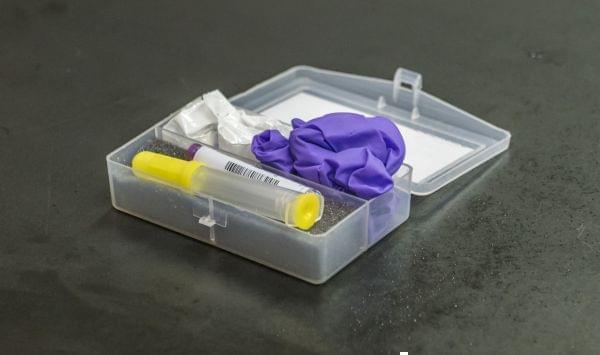Champaign County Officers To Carry And Administer Heroin Treatment

All Champaign County deputies will soon be carried Narcan kits, like the one seen here during Monday's training event at the Champaign County Sheriff's Office. (Darrel Hoemann/Midwest Center for Investigative Reporting)
Sheriff’s deputies in Champaign County will soon carry a medication that temporarily reverses some of the effects of a heroin overdose. Some call the escalating problem an epidemic.
They're often the first to respond to a growing number of cases. Officers are being trained to carry and use the drug Narcan. It’s part of a new partnership between Carle health officials and the sheriff’s department.
In the last year, Champaign County deputies responded to calls of nine people who have overdosed on heroin, while three of them died.
The sheriff’s department says they’re getting calls on not only heroin use, but other opioids, including prescription painkillers.
Sheriff’s Captain Shane Cook said providing Narcan kits to deputies makes sense - because they’ll often beat paramedics to the scene in a largely rural 1,000 square mile area.
“The EMS and fire is going to respond, but a lot of times we’ll get there first," he said. "And so therefore, if we carry this Narcan, we can administer it, and hopefully get them stable enough for the medical to get there – and do the transport.”
When heroin users overdose, they often stop breathing. Narcan, or naloxone, which is administered like nasal spray, can restore breathing, at least for a while.
Kathie Kane-Willis is director of the Illinois Consortium on Drug Policy at Roosevelt University. She said Narcan does more than buy time until medical personnel arrive.
“It saves the life then, and then the person can be transferred to the hospital, and stabilized and watched," she said. "The half-life of naloxone, the length that it works, is shorter than most opioids. So people can fall into an overdose again – that’s why it’s important to stay with somebody and watch them.”
Admininistering Narcan is harmless if it turns out the medication wasn’t needed. Community funds from Carle will pay for the new kits. They run $35, and the sheriff's department will have 60 of them initially.
 (Pictured: Carle EMS Coordinator Justin Stalter trains Champaign County Sheriff's Deputies on administering Narcan vials Monday at the sheriff's office. Photo by Darrell Hoemann.)
(Pictured: Carle EMS Coordinator Justin Stalter trains Champaign County Sheriff's Deputies on administering Narcan vials Monday at the sheriff's office. Photo by Darrell Hoemann.)
Justin Stalter is an emergency services coordinator at Carle. He said some calls don’t initially report an overdose, which can delay medical treatment.
“A lot of times, these types of situations don’t necessarily start with someone calling 911, saying ‘you know I have a loved one who’s overdosed’, who could be a domestic issue," he said. "So a lot of times, EMS is kind of summoned by law enforcement when they get on scene and realize there’s a medical issue that maybe started as a police issue.”
Cook said he expects Champaign County Deputies to be fully trained to use the Narcan vials by mid-July.
There’s a similar arrangement to the one between the Sheriff's Department and Carle in place in Decatur, where a nonprofit group, The Tyler Yount Foundation, funds the kits. Police in the Vermilion County town of Westville have also received training on administering Narcan.
Law enforcement in some Chicago suburbs carry them as well, but Kane-Willis says funding still remains the main obstacle for much of the state.
Legislation awaiting Illinois Gov. Bruce Rauner's signature would supply first responders with Narcan, as well as seek other ways, including education, to address a surge in heroin use. Costs are reportedly at $30 million.
Links
- Forces of Habit: Drugs and the Making of the Modern World
- Illinois House Passes Measure To Battle Heroin Abuse
- Pilot Program Set To Help Break Heroin Addiction
- Two Dead In String of Champaign Heroin Overdoses
- Heroin Task Force Might Need Extra Time
- The Struggle To Overcome Heroin Addiction
- Today’s Heroin Addict Is Young, White And Suburban
- Illinois Lawmakers To Form Heroin Task Force
- Synthetic Drugs Seized from Champaign Stores as Part of AG’s Initiative
- Illinois Consortium on Drug Policy

